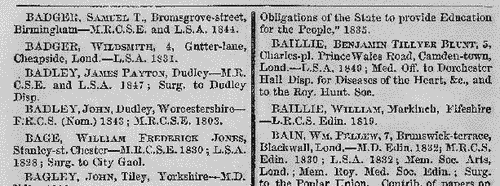Our indexes include entries for the spelling gillies. In the period you have requested, we have the following 309 records (displaying 101 to 110):
Medical Men
(1853)
The British Medical Directory for England, Scotland, and Wales of 1853 lists doctors, physicians, surgeons and other medical men. Each entry gives full name, surname first; address; qualifications; public appointments; and (where appropriate) a list of books and of works published in medical journals. | Sample scan, click to enlarge

|
Dissolutions of Partnerships
(1855)
Trade partnerships dissolved, or the removal of one partner from a partnership of several traders: in England and Wales
| Sample scan, click to enlarge

|
Insolvents
(1855)
Insolvency notices for England and Wales: insolvency often caused people to restart their lives elsewhere, so these are an important source for lost links | Sample scan, click to enlarge

|
Insolvents
(1855)
Insolvency notices for England and Wales: insolvency often caused people to restart their lives elsewhere, so these are an important source for lost links | Sample scan, click to enlarge

|
Scottish Partnerships Dissolved and Trustees of Bankrupts
(1855)
Trading partnerships dissolved in Scotland, and appointment of trustees for Scotch Sequestrations: business failure and bankruptcy often caused people to restart their lives elsewhere, so these are an important source for lost links
| Sample scan, click to enlarge

|
 Sailors and marines on H. M. S. Gladiator in the Crimean War
(1854-1856) Sailors and marines on H. M. S. Gladiator in the Crimean War
(1854-1856)
Sebastopol in the Crimea was the great Russian naval arsenal on the Black Sea. A combined assault by British, French and Turkish troops resulted in the reduction of Sebastopol and led to the Treaty of Paris of 27 April 1856, guaranteeing the independence of the Ottoman Empire. By Admiralty Order the Crimea Medal was awarded to sailors and marines present during the campaign, between 17 September 1854 (the first landing at Eupatoria) and 9 September 1855 (when the allies secured Sebastopol). The sailors' medals were mostly delivered to them on board ship in the course of 1856; the marines' medals were sent to their respective headquarters for distribution. The remarks as to distribution in this medal roll therefore give more specific information as to the whereabouts of the sailor recipients in 1856 than about the marines. Her Majesty's Ship Gladiator, a steam vessel, took part in the assault. Four clasps to this medal were awarded to the men present in the actions at Sebastopol itself, Inkerman, Balaklave (Balaclava) and (the sea of) Azoff, but the recipients of these clasps are recorded on separate rolls, not part of this index, but indexed on this site. | Sample scan, click to enlarge

|
 Sailors and marines on H. M. S. Hannibal in the Crimean War
(1854-1856) Sailors and marines on H. M. S. Hannibal in the Crimean War
(1854-1856)
Sebastopol in the Crimea was the great Russian naval arsenal on the Black Sea. A combined assault by British, French and Turkish troops resulted in the reduction of Sebastopol and led to the Treaty of Paris of 27 April 1856, guaranteeing the independence of the Ottoman Empire. By Admiralty Order the Crimea Medal was awarded to sailors and marines present during the campaign, between 17 September 1854 (the first landing at Eupatoria) and 9 September 1855 (when the allies secured Sebastopol). The sailors' medals were mostly delivered to them on board ship in the course of 1856; the marines' medals were sent to their respective headquarters for distribution. The remarks as to distribution in this medal roll therefore give more specific information as to the whereabouts of the sailor recipients in 1856 than about the marines. Her Majesty's Ship Hannibal, a 90-gun screw steamer, took part in the assault. Four clasps to this medal were awarded to the men present in the actions at Sebastopol itself, Inkerman, Balaklave (Balaclava) and (the sea of) Azoff, but the recipients of these clasps are recorded on separate rolls, not part of this index, but indexed on this site. This index also covers Mortar Boat No. 13, the Hannibal's tender. | Sample scan, click to enlarge

|
Dissolutions of Partnerships
(1856)
Trade partnerships dissolved, or the removal of one partner from a partnership of several traders, in England and Wales
| Sample scan, click to enlarge

|
Gentry in London
(1856)
The Post Office London Directory for 1856 includes this 'Court Directory', listing alphabetically by surname and christian name the upper class residents of the capital with their postal addresses. 'In order to afford space for the addresses, the abbreviation "esq." for esquire has no longer been appended to each name in the Court Directory. It should be understood that such should be added to the name of every gentleman in the following pages to which no inconsistent addition is affixed.' Decorations, honours &c. are generally given. Some gentlemen appear who are also listed (as professional men, &c.) in the commercial section. Those with second residences in the provinces usually have the country address given as well. | Sample scan, click to enlarge

|
Insolvents
(1856)
Insolvency notices for England and Wales: insolvency often caused people to restart their lives elsewhere, so these are an important source for lost links | Sample scan, click to enlarge

|
Research your ancestry, family history, genealogy and one-name study by direct access to original records and archives indexed by surname.












